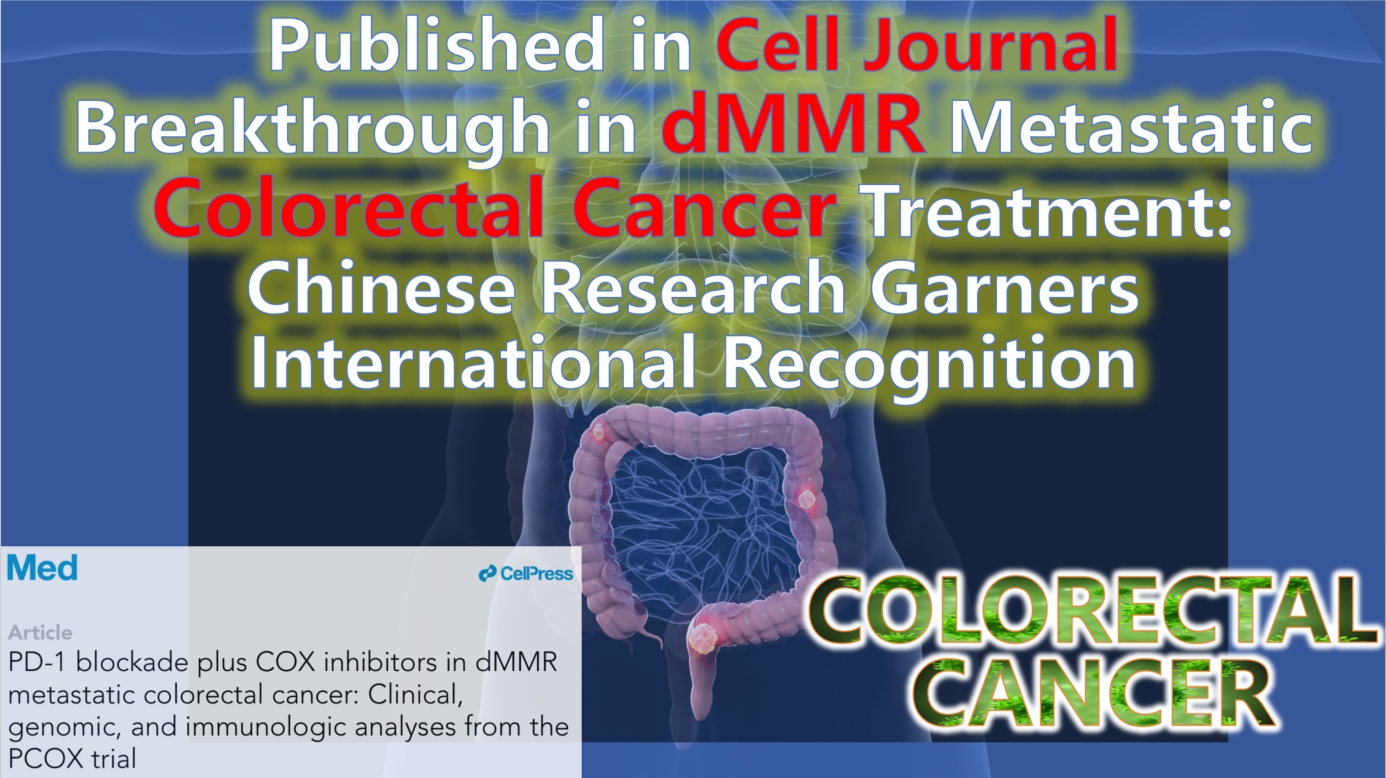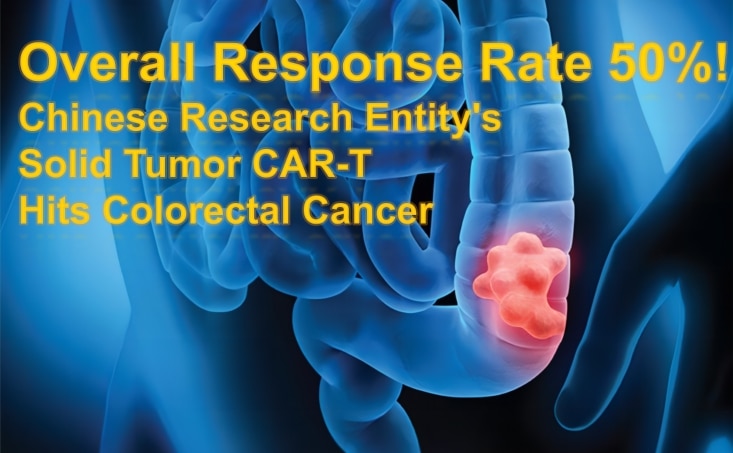Warning: Trying to access array offset on value of type bool in /www/wwwroot/www.medtourcn.com/wp-content/themes/medical-directory/framework/theme/medicaldirectory-image.php on line 78
Warning: Trying to access array offset on value of type bool in /www/wwwroot/www.medtourcn.com/wp-content/themes/medical-directory/framework/theme/medicaldirectory-image.php on line 79

Published in Cell Journal | Breakthrough in dMMR Metastatic Colorectal Cancer Treatment: Chinese Research Garners International Recognition
**Published in Cell Journal | Breakthrough in dMMR Metastatic Colorectal Cancer Treatment: Chinese Research Garners International Recognition**

Colorectal Cancer
#ColorectalCancer #PD1Antibody #dMMR #cell #cellpress #Med #PD-1 #CellJournal
A Chinese medical team has made a significant breakthrough in the treatment of dMMR (deficient mismatch repair) metastatic colorectal cancer. Recently, their latest research findings were published in the *Med* journal, a subsidiary of *Cell*, offering new treatment hope for patients with advanced colorectal cancer.
The study revealed that the combination of PD-1 antibody immunotherapy with COX inhibitors, drugs commonly used for anti-inflammatory treatment, significantly improved treatment effectiveness. This innovative strategy could substantially increase survival chances for patients with advanced colorectal cancer.
Colorectal cancer is the second most common cancer in China, and its incidence is on the rise. While PD-1 antibody immunotherapy has brought hope to some patients, its success rate is only 45%. Approximately 30% of dMMR metastatic colorectal cancer patients are resistant to PD-1 treatment. Therefore, the Chinese team explored combining PD-1 immunotherapy with COX inhibitors (such as celecoxib and aspirin) to overcome this resistance.
The team’s Phase 2 clinical trial yielded remarkable results. Among the 30 patients who received the combination therapy, the overall response rate was 73.3%, a 30% improvement over PD-1 monotherapy. After more than four years of follow-up, 65% of patients achieved progression-free survival, and 90% were still alive. Four patients reached complete remission, while 11 others underwent surgery, with 10 showing complete pathological remission.
In addition to the notable clinical outcomes, genomic and immunological analysis revealed that high expression of the TAPBP protein was associated with better treatment results. This discovery opens new avenues for the development of biomarkers to predict treatment response and for personalized treatment plans in the future.
Following the publication of the study, it attracted significant attention from the international medical community. Experts from Memorial Sloan Kettering Cancer Center in the U.S. wrote a commentary in the *Med* journal, highly praising the innovative therapy. They noted that the combination of COX inhibitors with PD-1 treatment not only increased the complete remission rate but also reduced immune suppression signals in the tumor microenvironment, enhancing the effectiveness of PD-1 therapy, with manageable side effects.
This research offers new hope for dMMR metastatic colorectal cancer patients worldwide, and further large-scale clinical trials are expected to confirm its efficacy. The combination of COX inhibitors with PD-1 immunotherapy could become a safe and effective treatment option for dMMR metastatic colorectal cancer patients, providing hope for long-term survival.
🎉🎉To assess whether the condition is suitable for CAR-T or clinic therapy, you can submit Advanced Medicine in China for preliminary evaluation!
WhatsApp: +8613717959070
(Https://wa.me/+8613717959070)
Email: doctor.huang@globecancer.com
#CancerResearch #MedicalInnovation #GlobalHealth #Immunotherapy #Colorectal #COXInhibitors
Warning: Trying to access array offset on value of type bool in /www/wwwroot/www.medtourcn.com/wp-content/themes/medical-directory/framework/theme/medicaldirectory-image.php on line 78
Warning: Trying to access array offset on value of type bool in /www/wwwroot/www.medtourcn.com/wp-content/themes/medical-directory/framework/theme/medicaldirectory-image.php on line 79

🔬✨ Overall Response Rate 50%! Chinese Research Entity’s Solid Tumor CAR-T Hits Colorectal Cancer
🔬✨ Overall Response Rate 50%! Chinese Research Entity’s Solid Tumor CAR-T Hits Colorectal Cancer

Colorectal Cancer
#Solidtumor
In the journey to conquer cancer, a significant breakthrough is stirring! Shanghai Sundise Biotech has successfully developed the first candidate product GCC19CART, based on its independently developed CoupledCAR® platform technology. This innovative autologous #CART therapy product is specifically designed to target solid tumors of recurrent/refractory metastatic colorectal cancer (R/R mCRC). Let’s delve into this milestone achievement together!
#GCC19CART
On April 19, 2022, Shanghai Sundise Biotech announced that its solid tumor CAR-T product GCC19CART had been granted Fast Track designation by the U.S. Food and Drug Administration (#FDA). This news implies that the development of GCC19CART will be accelerated, bringing hope and new treatment options to more colorectal cancer patients.
#NCCN
So, what is recurrent/refractory colorectal cancer? According to the definition by the National Comprehensive Cancer Network (NCCN), it refers to patients who have undergone multiple rounds of conventional treatment without success or have developed metastases, facing extremely limited treatment options. Current statistics show that the survival rate and objective response rate of such patients are extremely low, urgently requiring more effective treatment methods.
#colorectalcancer
GCC19CART has demonstrated significant clinical activity by targeting and eliminating cancer cells expressing the colorectal cancer tumor marker GCC. According to publicly available data, GCC is widely expressed in colorectal cancer and is highly expressed in metastatic colorectal cancer cells, making it an ideal target for treatment. Preliminary clinical trial results indicate that GCC19CART exhibits significant objective response rates and acceptable safety profiles in refractory metastatic colorectal cancer, bringing new hope to patients.
#ORR 50%
A multicenter Phase I dose-escalation clinical trial conducted in China showed that the objective response rate in the medium-dose group (2×106 CAR-T/kg) reached an encouraging 50%. This suggests that GCC19CART may become an important choice for treating recurrent/refractory colorectal cancer, bringing longer survival and better quality of life to patients.
#Hope
Colorectal cancer is a disease that seriously threatens human health, and the successful development and clinical trial results of GCC19CART bring us new hope. Let’s look forward together to the early clinical application of this innovative treatment method, bringing light to more patients in need of help!
🎉🎉To assess whether the condition is suitable for CAR-T or clinic therapy, you can submit Advanced Medicine in China for preliminary evaluation!
WhatsApp: 137 1795 9070
Email: doctor.huang@globecancer.com
💪💊 #ColorectalCancer #CARTtherapy #MedicalInnovation
Warning: Trying to access array offset on value of type bool in /www/wwwroot/www.medtourcn.com/wp-content/themes/medical-directory/framework/theme/medicaldirectory-image.php on line 78
Warning: Trying to access array offset on value of type bool in /www/wwwroot/www.medtourcn.com/wp-content/themes/medical-directory/framework/theme/medicaldirectory-image.php on line 79

AACR 2024/Breakthrough Chinese Research – Monotherapy for Late-stage #SolidTumors and #Lymphomas
 AACR 2024/Breakthrough Chinese Research – Monotherapy for Late-stage #SolidTumors and #Lymphomas
AACR 2024/Breakthrough Chinese Research – Monotherapy for Late-stage #SolidTumors and #Lymphomas

AACR2024
